THE CLASSIC HORROR FILM
By Jeffrey-Baptiste Tarlofsky
By Jeffrey-Baptiste Tarlofsky
Lesson 21 consists of 6 video lectures and transcripts of those lectures, and 5 film excerpts. Start with the lecture, Part 1, and continue down the page in sequence until you reach the end of the lesson.
レッスン21は6本のビデオレクチャー(レクチャーのテキストがビデオレクチャーの下に記載されています)と5本の動画で構成されています。
このレッスンは、ページをスクロールダウンしながら最初から順番に動画を見たりテキストを読んでください。
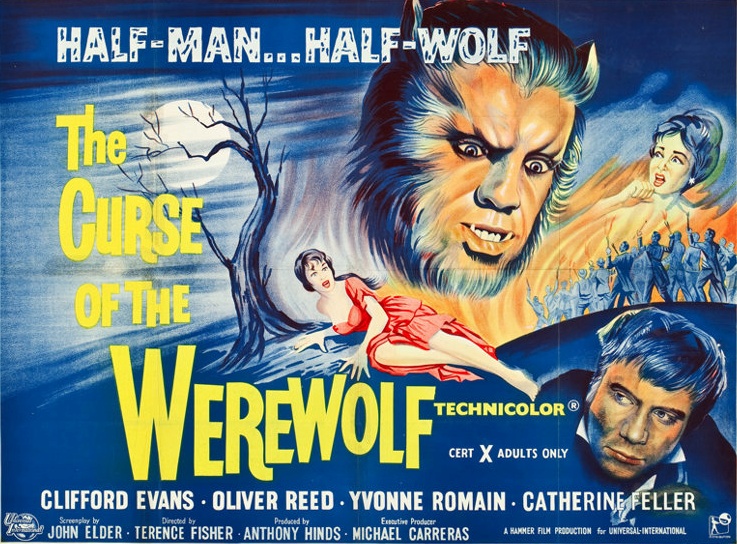
Directed by Terence Fisher
Produced by Anthony Hinds
Written by Anthony Hinds
Starring Clifford Evans, Oliver Reed, Yvonne Romain, Catherine Feller, Anthony Dawson, Michael Ripper
Music by Benjamin Frankel
Production company: Hammer Film Productions
Running time: 91 minutes
Part 1 – No one in Curse of the Werewolf attempts to explain that “lycanthropy” is a mental illness, that what is happening to little Leon is “all in his mind”. The kindly gentleman scholar who rescues Leon’s mother, the servant girl, from the forest, Don Alfredo Corledo, does not consult a doctor or psychiatrist about Leon’s affliction but rather talks to the village priest who immediately and clearly identifies Leon as a werewolf. A werewolf, he explains, is someone whose body has a human soul, but which is also possessed by the “spirit of a demon”. How a Catholic priest happens to believe in “demon spirits” may be explained by recalling that Satan was the angel Lucifer who fell from Heaven and with him fell a third of all the angels. These other fallen angels are the devils or demons who must serve Satan in Hell and who, like Satan himself, can also find ways to attack and torment human beings on Earth. If this sounds far-fetched, consider that demonic possession is still recognized by the Catholic Church and there are still ceremonies performed by special priests, called “exorcists“, who force the demon to leave the body of the person who has been possessed. Just because the Church believes in demonic possession, does not mean it is real, of course.
The most curious thing about what the priest says to Don Alfredo is not that Leon is possessed, but that there is no cure for his possession except love. That was certainly not Catholic teaching on the subject of possession. The official position of the Church would have been that only faith in God and the Church and the assistance of an exorcist could cure the victim. We should remember, however, that we are talking about a movie and in movies, the rules are made by the screenwriter, director, and producer…not the Church! According to the Church, love was, of course, desirable in a marriage, but men and women were not supposed to marry to fulfill their lustful desires for each other. According to the Church, the institution of marriage existed for the sole purpose of producing children, new “souls” for God.
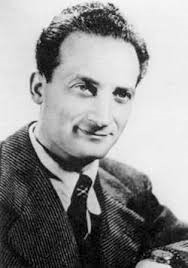
Guy Endore
Because Hammer was experiencing a budget crunch at the time they were making Curse of the Werewolf, the producer Anthony Hinds (following in the tradition of that other great horror film producer and anonymous screenwriter, Val Lewton) adapted Guy Endore’s novel for the film himself. Recall that the reason Universal Studios did not use The Werewolf of Paris as the basis for either of their werewolf films was because Guy Endore’s Communist affiliations made him one of the writers the Catholic Church in America was most eager to censor. Neither Hinds nor Hammer studios had any such fears of the Church, and Hinds fully explored the leftist sentiments of the novel.
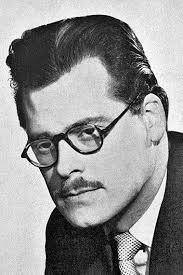
Anthony Hinds
Hinds was not a writer by trade, but the script he produced was superior to any Hammer would ever use in a horror film. Despite his success, however, Hinds was extremely shy about his involvement with films and did not take credit for the script for Curse of the Werewolf. Instead of using his own name, he used the name “John Elder” for the film credits and he would continue to use that name for all the many other writing credits for Hammer film he wrote throughout the 1960s and 1970s. However, Hinds would never again produce quite such a masterpiece as Curse of the Werewolf perhaps because he never again worked from a novel with such serious underlying social concerns as Endore’s Werewolf of Paris. As an amusing aside about Hinds, he was so protective of his privacy that even though he had produced or scripted over 50 films, he told neighbors he was a hairdresser!
Part 2 – You will have noticed that Leon no longer calls Don Alfredo “uncle”, but instead calls him ‘father”. As he promised the priest, Don Alfredo has adopted Leon and made him his son so as to give him as much love and care as is required to help him defeat the demon inside him. Don Alfredo reports to us that the love he and his maid Teresa gave Leon seems to have worked and that Leon grew into a “fine young man”. Leon goes out into the world to “find his fortune”, as the saying goes.
The part of the adult Leon was played by up-and-coming English movie actor Oliver Reed in his very first starring role. Reed, was only twenty-four when he played the part of the passionate young man we have just seen. He obviously handles his first starring role very well. On the other hand, recall that Lon Chaney Jr., who played the part of “young” Lawrence Talbot in The Wolf Man, was hired mainly for his family name. Chaney was ten years too old for the part, (Claude Raines who played his father was only fifty-two to Chaney’s thirty-five when the film was made, yet his father still refers to him as a ”boy”). Reed also enjoyed the advantage of being magnetically handsome while Lon Chaney Jr, was…mmmm, well, not handsome (to be generous). Finally, Reed was quite a talented actor while Lon Chaney Jr. was perhaps just about adequate.
Although the stories in the films are completely different, both Leon Corledo in Curse of the Werewolf and Lawrence Talbot in The Wolf Man were supposed to be young men who fall in love with young women from a class different from their own. This is a very common theme of love stories from all cultures in the world. But, for Leon, the challenge of falling in love with a woman from a higher class than his own is much greater than the challenge faced by Larry Talbot for having fallen in love with a woman from a class lower than his own. The issues here are related to both class and sex.
It should hardly be necessary for me to remind you that throughout most of human history and in almost all cultures, there has been a huge difference in the status of men and women. Whether we are talking about early twentieth-century England which is the setting of The Wolf Man, or eighteenth-century Spain, which is the setting of Curse of the Werewolf, or fifteenth century Japan, inequality was the general rule in all eras and cultures until very recently. Let’s take the example of The Wolf Man. Sir John tells his son that in the Talbot family the oldest son was “given consideration in everything” and the younger son often resented it and left home. This isn’t just how it worked in the Talbot family, of course, but how it worked in most of the world as well. In Japan, for example, the chonan, or eldest male heir, becomes the new head of the family on the death of his father and he also inherits all or almost all the property and wealth of the family.
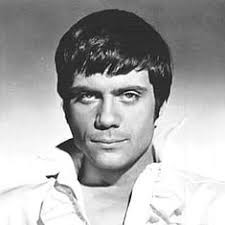
Oliver Reed
 This system is called “primogeniture”. Primogeniture is the right of succession belonging to the firstborn male child, especially in the feudal system (rule by the nobility). The whole estate passed to the eldest son in this system. If the eldest son should happen to die (as happened in The Wolf Man), the succession would pass to the second son (even if he were younger than a sister or sisters). In many, if not most cases, the succession always passed to the next closest male heir. Women, in many cultures, were not allowed to inherit property…because they were considered to be property. Women of whatever age or status were always under the “care” (rule or ownership) of their closest male relative. If this sounds primitive and barbaric, consider that exactly this system still exists to one degree or another in many Muslim countries in the world as well as quite a few African states and by custom (though not law) in much of Hindu (as well as Muslim) India. Please, don’t be too shocked by this. As I write this lecture in the year 2020, it is only one hundred years ago that women gained the right to vote in the United States of America. Several of the universities where I teach this course in Japan only began admitting women at about the time I came to Japan a little over thirty years ago.
This system is called “primogeniture”. Primogeniture is the right of succession belonging to the firstborn male child, especially in the feudal system (rule by the nobility). The whole estate passed to the eldest son in this system. If the eldest son should happen to die (as happened in The Wolf Man), the succession would pass to the second son (even if he were younger than a sister or sisters). In many, if not most cases, the succession always passed to the next closest male heir. Women, in many cultures, were not allowed to inherit property…because they were considered to be property. Women of whatever age or status were always under the “care” (rule or ownership) of their closest male relative. If this sounds primitive and barbaric, consider that exactly this system still exists to one degree or another in many Muslim countries in the world as well as quite a few African states and by custom (though not law) in much of Hindu (as well as Muslim) India. Please, don’t be too shocked by this. As I write this lecture in the year 2020, it is only one hundred years ago that women gained the right to vote in the United States of America. Several of the universities where I teach this course in Japan only began admitting women at about the time I came to Japan a little over thirty years ago.
It may sound odd, but in many ways, upper-class women had fewer freedoms than lower-class women. A peasant girl from a poor family might be told who she was supposed to marry, but her parents would most likely be much less strict about this than the local nobility would be regarding their daughter’s marriage. This was because marriage among the nobility was almost always a business transaction. Kings married their princess daughters to foreign princes so that the two kingdoms would not go to war, or so that they would have better trade relations, or so that the kingdoms should eventually be joined, or to create an alliance against some other kingdom. The nobility operated in much the same way as the royalty. The result would be marriages such as the one we saw at the very beginning of Curse of the Werewolf: a beautiful young noblewoman is married to the evil and ugly Marquis di Siniestro. The peasant in the tavern put it quite clearly when he asked, “Who has paid for the bride, poor child? We have!” The bride would have had no choice in this matter. Her father would have told her who she was marrying and she would have no choice in the matter. This is exactly the same problem Leon and Christina have later in the film. Christina’s father has arranged a “very good marriage” for her. By that, I mean it is very good for his business for his daughter to marry Rico Gomez even though she obviously can’t stand him.
Just as Larry and Gwen’s love affair was illicit because she was already engaged, so is the affair between Christina and Leon because her marriage has already been arranged. Screenwriter Anthony Hinds, using Guy Endore’s novel as a foundation, is showing the audience both the grotesque unfairness of the class system that turned young women into things to be sold and also the sexism that allowed this to occur. We have a horror movie here that is engaged in rather serious social criticism. What do such unjust systems lead to: tragedy, of course, and horror!
Part 3 – Despite having been made more than twenty years after The Wolf Man, Curse of the Werewolf is actually a much less modern film in some ways than The Wolf Man. This makes sense because of the time and place in which the two films are set. The Wolf Man is set in the early years of the twentieth century in England, while Curse of the Werewolf is set in late eighteenth-century Spain. The chief difference between the settings is that in England at the beginning of the twentieth century there would have been an almost universal acceptance of science as the means for explaining the world. Larry’s father, Sir John, is himself a prominent gentleman scientist, an astronomer. Astronomers are the men of science who most strongly condemn any “superstitious nonsense” about the stars having the power to govern our lives (that is the pseudo-science of astronomy that is no more than…well, fortune-telling such as the Gypsies in the film engage in).
In contrast to England in the early twentieth century, Spain in the late eighteenth century would have been a place where religious beliefs, superstitions, and folk legends would be far more accepted as explanations for the mysteries of the world. So, when he is told about Leon’s “affliction”, the priest explained to Don Alfredo that Leon was a werewolf. He gives an entirely supernatural explanation of “lycanthropy” by explaining that a werewolf is “a body occupied by both a human soul and a demonic spirit that fight for control of the body”.
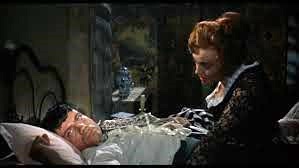 The priest further explained that the “endless cycle of the full moon when the forces of evil are at their strongest” would be the most dangerous time for Leon. Sir John, the scientist and astronomer, would have scoffed at the idea of the moon being able to transform a man into a monster. But, both police and mental health experts today agree that during the period of the full moon more bizarre crimes are committed than at other times. This is a well-documented fact. What is not known is whether there is a true physical reason for this or whether it is purely psychological. Sir John believes that a man can believe anything about himself “when lost in the maze of his own mind”. As for Lycanthropy? Sir John explains to Larry that legends are often attempts to explain very real things and the werewolf legend was simply a way for people to express the simple truth that there is good and evil in all of us.
The priest further explained that the “endless cycle of the full moon when the forces of evil are at their strongest” would be the most dangerous time for Leon. Sir John, the scientist and astronomer, would have scoffed at the idea of the moon being able to transform a man into a monster. But, both police and mental health experts today agree that during the period of the full moon more bizarre crimes are committed than at other times. This is a well-documented fact. What is not known is whether there is a true physical reason for this or whether it is purely psychological. Sir John believes that a man can believe anything about himself “when lost in the maze of his own mind”. As for Lycanthropy? Sir John explains to Larry that legends are often attempts to explain very real things and the werewolf legend was simply a way for people to express the simple truth that there is good and evil in all of us.
 In other words, while they explain it in very different ways, Sir John and the priest are saying almost the same thing: a werewolf is a man struggling with two sides of himself, the good and the evil. The difference is that the priest believes that physical transformation can occur while Sir John thinks that such a physical transformation is just “witches tales and nonsense”. This is why he ties Larry to the chair and insists he watch the wolf hunt so “you’ll see for yourself that this werewolf nonsense is all in your mind”.
In other words, while they explain it in very different ways, Sir John and the priest are saying almost the same thing: a werewolf is a man struggling with two sides of himself, the good and the evil. The difference is that the priest believes that physical transformation can occur while Sir John thinks that such a physical transformation is just “witches tales and nonsense”. This is why he ties Larry to the chair and insists he watch the wolf hunt so “you’ll see for yourself that this werewolf nonsense is all in your mind”.
No one in Curse of the Werewolf tries to tell Leon that his affliction is “just in your mind”. Nevertheless, there is a very genuine psychological component to his condition. The priest also explained to Don Alfredo that “whatever weakens the human soul – vice, greed, hatred, solitude…” enables the spirit to gain control of the body. But, “warmth, fellowship, and love raise the human soul” and keep the spirit of the demon from gaining control. But isn’t this true for all human beings? In fact, isn’t this something we have already talked about in our class? In Phantom of the Opera, Erik tells Christine that “if I am the Phantom, it is because that is what men have made me”. On the other hand, we saw that the “love and care” Don Alfredo and Teresa gave Leon prevented him from transforming into a werewolf for many, many years. What went wrong when he left home?
The priest had explained that the only possible cure for Leon was if he found “true love”. This reminds us of what Erik demanded from Christine in Phantom of the Opera. Erik said, “your love will transform me”. I also remind you that in Francis Ford Coppola’s film Bram Stoker’s Dracula, Mina/Elizabeta’s love does transform Dracula…actually saving his soul from going to hell. So again, I ask: What went wrong with Leon? It seems he found true love with Christina. Why does he then change and kill the prostitute?
Please think about this before you go to the next excerpt. Try to write your thoughts down in your notes.
Part 4 – Leon not only killed the prostitute, he also killed his co-worker and friend, Jose, and then he killed the drunken old shepherd. But it is the first killing that is most important. Let us consider again the case of Erik, the phantom of the opera. He kidnaps Christine not once, but twice; he tries to reason with her, bribe her, he begs her, he threatens her. What does he want from her? Love. He wants her to give him love. I explained that you can force someone to do almost anything, but you cannot force someone to love you. Love is freely given or it is not love. But Christina gives Leon her love freely and completely so why does Leon change?
Some of you have doubtless figured it out. Let me give you one more hint if you are still confused. Remember Dracula sneaking into women’s bedrooms and biting them on the neck? The only way the Hollywood censors let him do that was because he was a vampire, otherwise what he was doing would have been considered a sexual attack. What I am saying is — don’t forget about sex. The love that Don Alfredo and Teresa give Leon when he was a little boy replaces the missing love he did not have from his natural parents, the servant girl and the beggar (who have both died). Erik had never even had parental love so that when Christine (in the novel) kissed him on the forehead it was enough for him. But the “love” that the priest says Leon needs is the “love of a young girl” not a parent. He is talking about romantic love.
Romantic love leads to sex, of course. When two people fall in love the way Christina and Leon are in love they have sex. That is normal. But Leon and Christina live in a world completely dominated by the Catholic Church, which has very strict rules about sex. A man and a woman are only allowed to have sex when they are married in an officially sanctioned church wedding conducted by a priest. This is why Leon begged Christina to marry him, but she knew it was impossible because her father has arranged her marriage to Rico Gomez.
Christina has told Leon she cannot see him on Saturday night because she has to go out with Rico Gomez, so Leon plans to stay in that night until Jose teases him so much he agrees to go out with him to a “very respectable place”. The place they end up in is a drinking and gambling establishment, but it is also most certainly a house of prostitution…i.e., a place where sex is sold. The two girls sitting and drinking with Leon and Jose are prostitutes. But this is not at all what Leon wants! He does not want to sit drinking with this woman he doesn’t know or care about and he certainly does not want to have sex with her. He wants to be with the woman he truly loves, Christina. He would probably be happy just to go for a walk with her in the moonlight. Moonlight? As it happens, by bad luck, it is also the night of the full moon.
When Leon goes outside for some air another prostitute approaches him. She seems genuinely attracted to him, but this is also a chance for her to get a customer. She takes Leon upstairs to her room and begins seducing him. As we already said, Dracula sneaking into women’s bedrooms and biting them on the neck was a symbolic form of rape. Curse of the Werewolf makes the link between monstrosity and sexual violence much stronger and clearer in this scene. The prostitute does succeed in “arousing” Leon, but it is the wrong kind of arousal. She has awakened the demon spirit in him which first bites her, then kills her…and then the others.
So, let me put it this way to you. Sex isn’t an evil thing, it is a wonderful thing. But when Leon’s love and sexual desires are frustrated by the social system that will not let him be with Christina, the evil side of him comes out, and instead of a normal, healthy, and loving sexual relationship with the woman he loves, he turns to sexual violence (rape) and murder. That seems to be what the film is showing us. I will take issue with this in Part 5.
Part 5 – We now know that Leon went a whole night during the full moon without changing, ostensibly (apparently) because he was with Christina. It is at this point that I wish to express some…skepticism. Can love really triumph over evil in this way? My guarded answer is “Yes…but…”. Consider the case of Dracula at the end of Bram Stoker’s Dracula. Because Dracula, at last, finds his long lost love and because she truly loves him in return (she actually protects him from her own husband who wants to destroy him, and then she kisses him on the lips even though he is in his monstrous form ) we see him transformed back into a human being who then begs her to “give me peace”. She drives the sword deeper into his breast and he dies, but his soul goes to heaven! It is a beautiful love story and the ending is quite magnificent and a total transformation of the Dracula story…but, does it make sense? Isn’t “evil” not what you are, but what you do? Dracula was still killing people just before Mina/Elizabeta restores his humanity. Can you suddenly become “good” just because someone else loves you? Would God really forgive someone for four hundred years of being evil just because…well…because he feels better?
Or take the case of Erik. Erik “loved” Christine and believed that if only she loved him in return he could stop being evil. But isn’t being evil all about making choices. Ever since Adam and Eve ate the fruit, they knew what was good and what was evil. God lets humans choose between the two, but the responsibility to choose good over evil is ours because we all know we aren’t supposed to steal, or rape or murder, and so on. If Erik does those things, it is his responsibility because he is free to make his own choices.
Yet, we do understand that appearances can be tricky. The Frankenstein monster was big and ugly and scary and he appeared to be guilty to the villagers, but when we carefully thought about the three deaths he caused in the first movie, we concluded that he was not guilty of murder because the first two deaths were in self-defense, while the third was an accident. So, for Erik to say “if only Christine would love me I would stop doing this” is ridiculous because it is his choice to stop being evil, not hers.
The priest said Leon needed a young girl to love him so he could stop being evil. This seems to be almost the reverse of the truth. The truth is that it may be important that Christina love him, but what is more important is that he should love her enough to make his own decision to be good. Choosing good over evil is our own responsibility, not the responsibility of our parents, our teachers, our lovers, or anyone else. We are responsible. Of course, this implies that we can choose. There is one reason why someone might not actually be free to make such a choice.
Part 6 – As I said previously, there is one reason why one might not be free to choose good over evil. In cases where someone has no control over their actions, they cannot be held responsible for those actions. In other words, you are only evil if you know what you are doing is evil or if you understand the difference between good and evil. Certainly, when they are in their human form, neither Larry Talbot nor Leon Corledo would have murdered anyone. They are both basically good men…when they can control themselves. But when they change into their werewolf forms, they have no control over their actions. They cannot make rational decisions based on knowing the difference between good and evil. Both Larry Talbot and Leon Corledo almost attacked and killed the women they loved when they were in the werewolf forms. Neither man would have done this had he been capable of rational thought. What I am saying is that in a legal sense, a werewolf is insane.
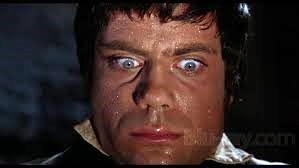 Neither man even has any memory of killing anyone once they change back into their human form. According to Wikipedia, an “insanity defense argues that the defendant is not responsible for his or her actions due to an episodic or persistent psychiatric disease at the time of the criminal act”. If ever there was a case of “episodic” psychiatric disease it would be the monthly transformation of these men into werewolves when the moon is full. We are right back to the opening scene of The Wolf Man in which the books tells us that “lycanthropy” (werewolfism) is a mental illness. Perhaps it is a mental illness with physical side effects?
Neither man even has any memory of killing anyone once they change back into their human form. According to Wikipedia, an “insanity defense argues that the defendant is not responsible for his or her actions due to an episodic or persistent psychiatric disease at the time of the criminal act”. If ever there was a case of “episodic” psychiatric disease it would be the monthly transformation of these men into werewolves when the moon is full. We are right back to the opening scene of The Wolf Man in which the books tells us that “lycanthropy” (werewolfism) is a mental illness. Perhaps it is a mental illness with physical side effects?
Contrary to what most people believe, an insanity defense is very hard to make and is often rejected by the courts or not believed by juries.
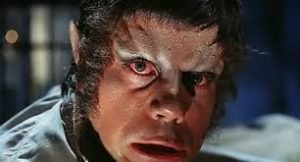 Unfortunately for both Larry and Leon, they are never put on trial in a court of law, they are just killed while they are in their werewolf forms. By the way, you did notice that despite the huge differences in the two stories, both Larry Talbot and Leon Corledo are killed by their own fathers? That invites all kinds of interesting speculation. Why don’t you think about this and write your thoughts down in your notes.
Unfortunately for both Larry and Leon, they are never put on trial in a court of law, they are just killed while they are in their werewolf forms. By the way, you did notice that despite the huge differences in the two stories, both Larry Talbot and Leon Corledo are killed by their own fathers? That invites all kinds of interesting speculation. Why don’t you think about this and write your thoughts down in your notes.